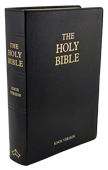The Holy Bible – Knox Translation
The Prophecy of Isaias
|
Chapter 15
|
1
What burden for Moab? Ar Moab has fallen in a night, and all is still; Moab’s battlements have fallen in a night, and all is still!
2
Prince✻ and people of Dibon have gone up to the hill-shrines to lament; on Nabo and on Medaba, Moab cries aloud, every head cropped, every beard shaved in mourning.
3
In the streets, men walk girded with sackcloth; house-top and square echo with loud crying, that breaks into tears.
4
The dirge goes up from Hesebon and Eleale, so loud that Jasa hears it; well may the warriors of Moab cry out; the very soul of Moab utters a cry.
5
My heart laments for Moab, once ringed with walled cities as far as Segor; Segor that now moans like a full-grown heifer.✻ There is weeping on the slopes of Luith; along the Oronaim road they wail aloud for misery.
6
The waters of Nemrim will turn into desert; old grass has withered, new grass has failed, and their banks are green no more.
7
Heavy their reckoning, to match the abundance of their riches; a nation in exile, carried away to the Vale of Willows.✻
8
A cry goes up all about the frontiers of Moab; Gallim echoes the lament, and the well of Elim hears the sound of it.
9
Dibon’s waters already swollen with blood; and still for Dibon I have perils in store, lions to meet the fugitives, the remnant that is left in the land of Moab.✻


